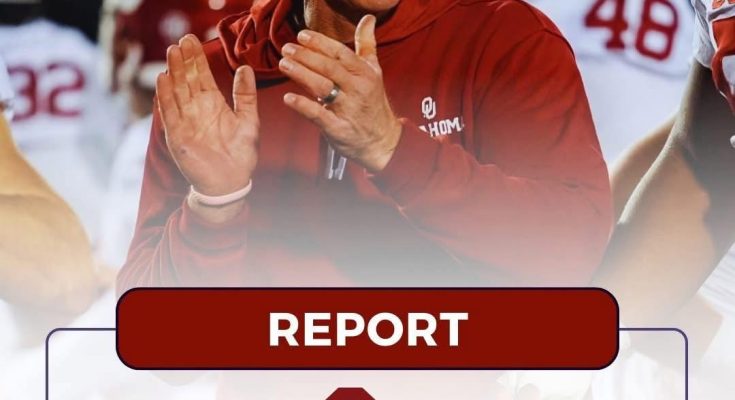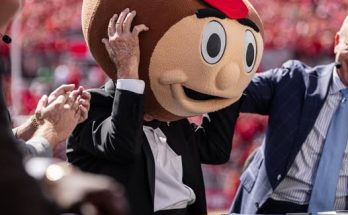Oklahoma Sooners head football coach Brent Venables has made what is being hailed as one of the most selfless and strategically savvy moves in recent college football memory, announcing that he will take a $1 million pay cut for the 2025 season—money that will instead be reallocated to support the program’s revenue-sharing initiatives. This gesture, disclosed in late August 2025 via a USA Today report and confirmed by multiple outlets, was not prompted by university officials but initiated by Venables himself as a one-time “give-back.” His rationale is rooted in a practical and forward-thinking understanding of the evolving financial landscape of college football, with particular emphasis on funding media rights, NIL (Name, Image, and Likeness) efforts, and retention and recruitment of student-athletes .
The specifics of the adjustment are straightforward yet striking in scale: Venables’ originally contracted salary of $8.55 million for the 2025 season has been reduced to $7.55 million—a full million-dollar decrease. Crucially, this is not part of a renegotiated long-term contract; rather, it is a singular concession. His salary schedule for subsequent seasons remains intact, with guaranteed earnings of $8.65 million in 2026 and 2027, rising to $8.75 million in 2028, and $8.85 million in 2029 .
Coach Venables has long been recognized for his leadership and integrity, with his career spanning assistant coaching roles at Kansas State, Clemson, and a return to Oklahoma where he won the Broyles Award in 2016 as the country’s top assistant coach. He became head coach at Oklahoma in late 2021, bringing with him decades of experience and a commitment to a tradition of excellence at Norman . He secured a new six-year contract in mid-2024—with the Board of Regents approving a deal worth roughly $51.6 million, averaging some $8.6 million per year, including performance incentives such as $250,000 for an SEC championship and $1 million for winning a national title .
The 2024 season under Venables did not meet the lofty expectations typically associated with Oklahoma football. The Sooners posted a 6‑7 record—their first in two decades—even amid their first season in the more formidable SEC. That performance followed a 10‑3 campaign in 2023, giving Venables an overall record of 22‑17 through three seasons. While there were signs of potential, including a record-setting recruiting class and structural improvements, inconsistency and brutal losses to rivals such as Texas weighed on the program .
This downturn in performance is widely seen as a driving factor behind Venables’ offer to sacrifice part of his salary. University athletics director Joe Castiglione praised the gesture: “It really shows a lot of leadership on Brent’s part… He recognized the need to retain players already on our roster and those we needed to recruit, and he wanted to help participate in the revenue‑sharing formula going forward” . Effectively, Venables leveraged his own compensation to help fund areas critical to keeping talent in Norman and enhancing the Sooners’ competitive posture—especially as NIL spending and transfer portal activity continue to reshape college football economics.
Venables’ pay cut is not unique in concept, but remains bold in execution. Other coaches have taken similar steps: LSU’s Brian Kelly announced he would donate $1 million of his salary to his program’s NIL collective; at Florida State, Mike Norvell agreed to direct $4.5 million toward fundraising, with the possibility of recouping the amount depending on performance. Even within the state, Oklahoma State’s Mike Gundy took a $1 million cut with analogous goals of supporting revenue-sharing priorities .
There’s deeper strategic nuance here, underscored by wider shifts in collegiate athletics. The post–House v. NCAA settlement era introduced a revenue-sharing model that could direct up to $20.5 million to student-athletes in 2025, with more to come in the years ahead. Venables’ decision, then, signals an understanding that to compete for top-tier talent, schools must invest early and meaningfully—especially amid structural financial transformations .
On a symbolic level, Venables’ self-imposed reduction conveys confidence and stability at a turbulent time. As OSU’s general manager Jim Nagy observed, such an action might indicate a coach’s belief in his long-term prospects: “Why would he voluntarily give up pay if he thinks he’s going to be fired at the end of the season?” Nagy said. That, he noted, speaks volumes about Venables as a leader . It underscores a message of belief in the program, belief in the university’s direction—and an understanding that sometimes leadership requires personal sacrifice for collective gain.
The financial mechanics behind this move are important to highlight. Venables’ contract is fully guaranteed; should he be fired without cause, OU owes the full remaining value. That buyout obligation was projected at $44.8 million entering 2025, dropping to $34.9 million after this year, and declining each subsequent season through 2029 . That structure means Venables’ action is not about personal compensation security—it’s about operational choices. Meanwhile, his long-term earning trajectory remains intact, affirming that this is a one-time, strategic decision rather than a renegotiation of his value to the program.
Beyond the financials, Venables’ conduct sends lessons for leadership, organizational culture, and stakeholder trust. In times of uncertainty or underperformance, the willingness of a leader to absorb personal cost—and redirect it where it’s needed most—can strengthen organizational cohesion. It also sets a tone around accountability and collective responsibility. In a broader sense, this may offer a model for how high-profile coaches can engage in resource management and team-building within a rapidly changing NCAA context.
Ultimately, this move opens several questions worth reflection. Will this investment tangibly improve Oklahoma’s retention and recruitment outcomes? Can that translate into improved on-field performance in a treacherous SEC landscape? What message does this send to future coaching hires about the value of leadership over personal gain? And, in the broader collegiate athletics ecosystem, could Venables’ choice spur other high-paid coaches to similarly redirect compensation to strategic program priorities?
For now, Venables has shifted the conversation from win-loss records to leadership ethos. As the Sooners embark on their 2025 season—with a testing schedule that includes Michigan, Texas, Alabama, LSU, and Tennessee —the implications of his $1 million give-back will be watched closely. Whether translated into wins, recruits, improved morale, or simply a renewed sense of direction, the move has already provided a powerful statement: the success of a program is not just measured in touchdowns and titles, but in the character and choices of its leaders.
In examining Coach Brent Venables’ $1 million donation from his 2025 salary toward revenue-sharing, we see a fusion of financial acumen, leadership, sacrifice, and strategic foresight—delivered at a moment when stability and faith in the future are both desperately needed. It’s an act that transcends the ledger sheet and speaks deeply to the heart of what it means to lead in modern college sports.



